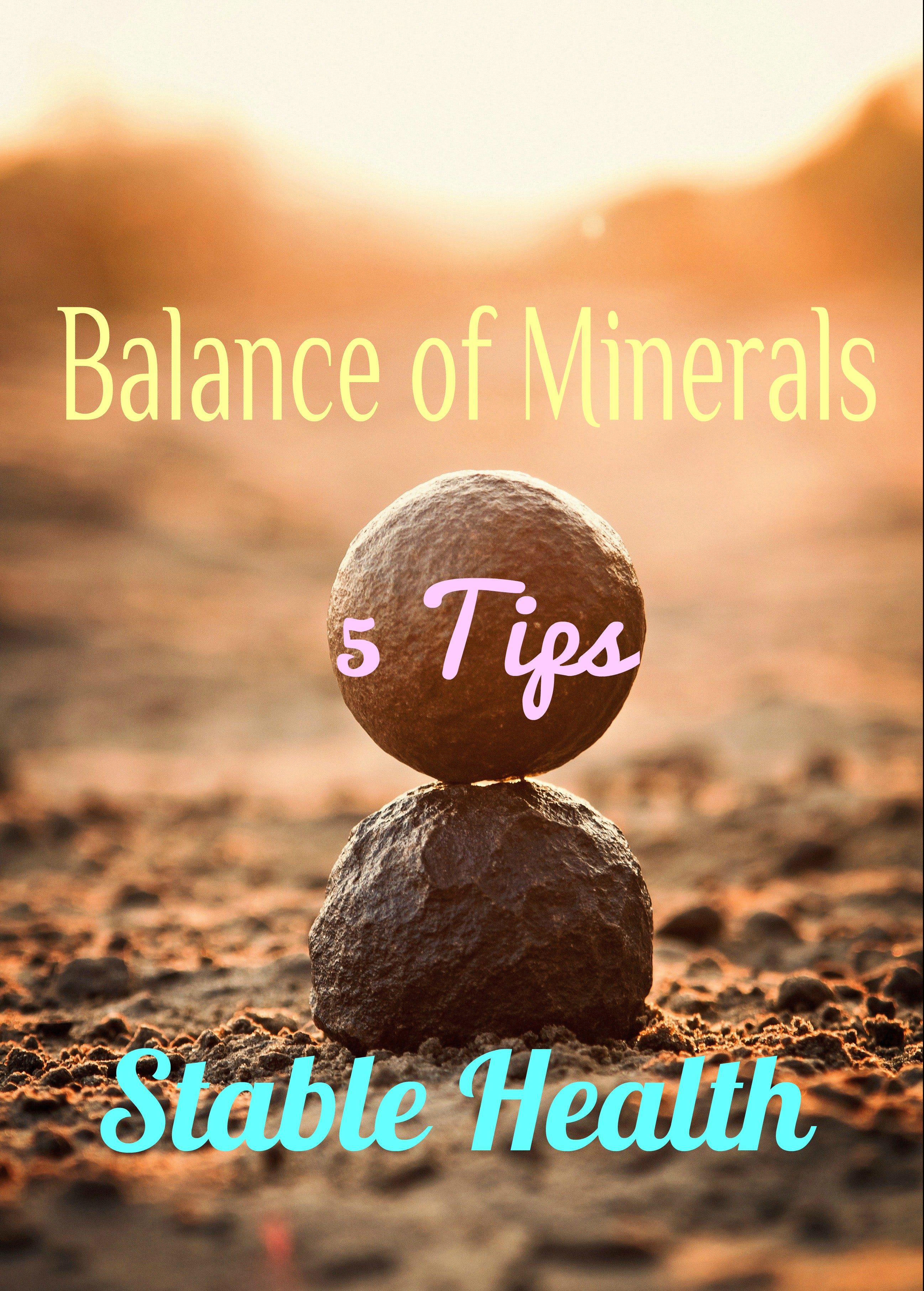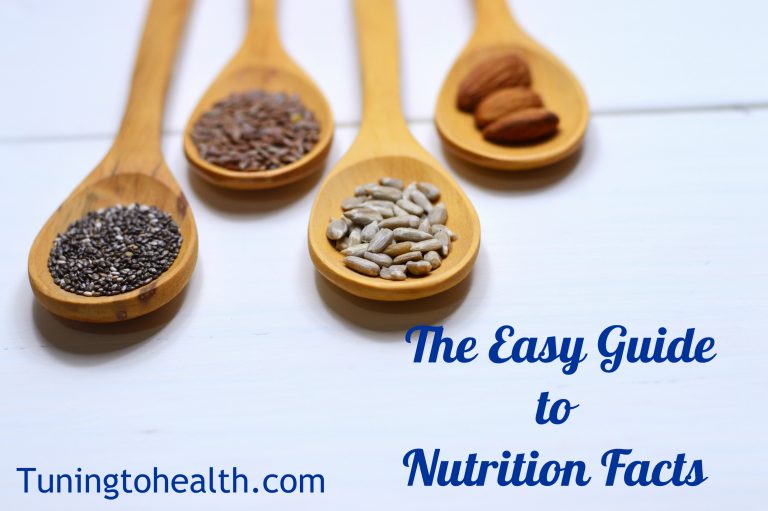The Balance of Minerals that Keep You Healthy
What are Minerals?
Sodium, potassium, calcium, iron, zinc… the list goes on. What are they? Why do people talk about them so much? Why do we go to the fitness store and buy up bottles upon bottles of supplements that contain these Minerals? How on Earth do people think that these Minerals are somehow good for your health?
I am often filled with dread when I think back to high school chemistry class and remember memorizing the Periodic Table! But we will not discuss atomic numbers or valence electrons here! We simply need to know that many elements can form a mineral. And a mineral is essentially a rock.
Chemists would scoff at this crude definition! But I want you to start thinking about something… How can something as dead as a rock still be of vital importance to your well-being?
It seems utterly impossible! After all, we do not normally roam the Earth looking for tasty and scrumptious rocks to eat! However if you do find yourself craving odd things like ice or dirt, consider speaking with your Doctor. There may be an underlying anemia.
As human beings, we have been exposed to the elements for centuries and millennia! The Earth’s resources are incorporated into our very cells! Therefore we would be wise to acknowledge our symbiotic relationship with this planet and attempt to understand how every Mineral plays a vital role within our bodies at the cellular level. Why? Because a deficiency or surplus can lead to long term health consequences!
I will speak here about Minerals at large and attempt to lay the foundation for future posts about clinically significant outcomes.
Where the Body Begins
The story of acquiring Minerals begins with FOOD!
We put food into our mouths with the main intention of chewing, swallowing, digesting, and eventually absorbing its nutrients! We can often forget that basic necessity because we have the ability to derive pleasure from our food. Creativity and ingenuity can craft food with new methods of preparation to make something unexpected and spectacular! But the root essence of all food is to simply nourish our bodies.
We need protein, carbohydrates, and fats to build, maintain, and fuel our bodies at the cellular level. But we also need Minerals to facilitate these basic cellular functions! And we need certain types of Minerals more than others.
Therefore Minerals are divided into 2 main categories:
1. Macrominerals
Minerals we need at a greater volume. These include electrolytes that the Doctor normally tests for in a blood draw:
-
-
Sodium (Normal range of 135 – 145 mEq/L)
-
– Regulates blood pressure by increasing or decreasing the amount of water in our blood vessels as well as the water in our cells and other tissues. Also important for nerves to carry a message from one to the other. Therefore an imbalance of Sodium can lead to:
-
-
-
HYPOnatremia (Low Sodium levels)
- Changes in your personality and mental acuity.
- Confusion and lethargy may also be experienced.
- If severe enough, patients may act as though they are drunk. They may also have twitchy muscles and abnormally fast reflexes. Ultimately, patients may experience seizures, coma, or death.
-
HYPERnatremia (High Sodium levels)
- The elderly or any disabled loved one are especially prone to this because they may not have the ability to go get a drink of water.
- Similar signs and symptoms result as seen in Hyponatremia above due to the major effects upon the nervous system and the brain.
- Kidneys are responsible for regulating Sodium and Water. If the kidney malfunctions, it can lose too much water without getting rid of the leftover Sodium.
- The body can also lose water through extreme sweating, diarrhea, and vomiting.
- For more information, check out the Merck Manual on Hyponatremia and on Hypernatremia. Also speak with your Doctor.
-
-
Chloride (Normal range of 98 – 106 mEq/L)
- Vital for the blood to transport Carbon Dioxide to the lungs for exhalation.
- Necessary for the lungs to excrete and clear mucus (People with Cystic Fibrosis cannot clear mucus because Chloride cannot be transported properly).
- Required for digestive enzymes of the pancreas to go into the small intestine and continue digestion of food after leaving the stomach (Yet another problem Cystic Fibrosis patients contend with because without digesting food completely, the intestines cannot absorb the raw materials. This results in malnourished patients).
- Helps create the hydrochloric acid in the stomach to begin food digestion.
- Involved in reabsorption of water and other minerals in the kidneys.
- Helps control whether or not a nerve should send a particular message to another nerve. This prevents hyper-excitability of the nerve and helps guard against seizures and painful muscular contractions.
-
Potassium (Normal range of 3.5 – 5 mEq/L)
- Vital for proper electrical activity of the heart!
- Levels that are too high or too low can cause the heart to beat in odd ways and potentially stop beating completely!
- People with any kidney disease MUST pay attention to this Mineral because the kidney is responsible for regulating Potassium in the body. Therefore if the kidney is not well, then it may not be able to keep potassium in the proper range.
- People taking blood pressure medications may also experience problems since these medications will promote the loss of Potassium in the urine.
- Patients with Diabetes and taking Insulin may also have problems because Insulin will drive Potassium into your cells the same way it drives sugar into your cells! Therefore your potassium levels might drop below normal and cause you to experience symptoms.
- I only mentioned a few possibilities. But irregular potassium levels are NOT taken lightly and ALWAYS warrants further investigation!
- Speak with your Doctor IMMEDIATELY if you experience muscle weakness, paralysis, or heart palpitations (You can feel your heart is beating in weird or odd ways in your chest)! A trip to the Emergency Room may be required, so DO NOT DELAY!
- For more information, your Doctor is the BEST source. If you would like information online as a supplement to your Doctor, I trust the Merck Manual. You can find information on Hyperkalemia (High Potassium levels) and Hypokalemia (Low Potassium levels) with these links.
-
Calcium (Normal range of 9.0 – 10.5 mg/L)
-
– Important for healthy bones. However bones are simply a reservoir of Calcium. This Mineral is used by a MULTITUDE of systems in the body! For example, every contraction of every muscle requires calcium!
-
-
-
Hypocalcemia (Low Calcium levels)
- Often not noticed until the nervous system or muscular symptoms develop. But there may be some tingling sensations in the hands, feet, and lips.
- People may experience depression for unknown reasons. They may also experience dementia or psychosis when none existed before. Patients may even have seizures without any history of it!
- Muscular symptoms include abnormally fast reflexes and muscle spasms that can be VERY painful. These spasms can be anywhere in the body and include facial muscles as well as muscles of the throat which can make it difficult to eat, swallow, speak, or breathe!
- The Doctor will test this possibility in the clinic with a physical exam and then confirm his/her findings with a blood test to check Calcium levels.
-
Hypercalcemia (High Calcium levels)
- If low Calcium levels excite muscles and nerves, HIGH Calcium levels have the opposite effect!
- The Digestive system will slow down and make you feel constipated, nauseous, unwilling to eat and may force you to vomit! You could have pain in your abdomen because nothing is moving in there!
- The Skeletal Muscle system may also slow down so that reflexes are weak with apparently little to no strength.
- The heart may also be affected and cause it to beat too rapidly or skip beats in an irregular manner.
- People may feel overly emotional, confused, delirious, or psychotic. Patients may even fall into a coma if Calcium levels are dangerously high!
- High Calcium levels forces the kidney to work overtime in an effort to get rid of the excess Mineral. Therefore a kidney stone may develop as a result and potentially cause damage!
- Finally, extremely high Calcium levels (above 14 mg/L) may indicate the presence of cancer! So do not delay that Doctor’s appointment!
-
-
If you feel any symptoms mentioned here, please speak with your Doctor to resolve them! You can also find information on Hypocalcemia and Hypercalcemia with these links to the Merck Manual.
-
-
Magnesium (Normal range of 1.8 – 3.0 mg/dl)
- If Calcium levels seem reluctant to respond to treatment, your Doctor may check for low Magnesium levels.
- BEWARE: Magnesium ALSO affects Potassium levels too!
- Magnesium helps raise levels of Calcium and Potassium in your bloodstream.
- Therefore signs and symptoms are essentially the same with those mentioned for Calcium and Potassium.
- If Magnesium is too high, you can have high levels of Calcium and/or Potassium.
- If Magnesium is too low, you can have low levels of Calcium and/or Potassium.
- Therefore if you sense anything wrong, ESPECIALLY WITH ODD SENSATIONS IN THE CHEST, you MUST speak with your Doctor NOW!
- Normally our kidneys are VERY GOOD at balancing these Minerals without a second thought. But if you have kidney disease or take medications that could compromise its function, DO NOT HESITATE to contact your healthcare provider if you notice any of the symptoms mentioned above!
-
Phosphate (Normal range of 3.0 – 4.5 mg/dl)
- VERY important for proper bone mineralization!
- Low levels of Phosphates can cause bone loss and result in a softening of the bones known as Osteomalacia (NOT to be confused with Osteoporosis, which is a condition that makes the bones brittle with a lot of holes).
- High levels of Phosphates will cause Calcium to deposit everywhere! The most concerning place is in your arteries. Once the arteries begin to calcify, they get stiff. As a result, the blood pressure may go up and lead to other cardiovascular problems like heart attack and stroke!
- High Phosphate levels can also cause Calcium to deposit in the kidneys, which create kidney stones.
-
2. Trace minerals
Essential minerals only required at lesser amounts than Macrominerals. A deficiency in each of these minerals can lead to:
-
-
Chromium
- Weakened control of blood sugar, especially in people with Diabetes
-
Copper
- Fragile and brittle hair
- Odd skin coloring
- Problems with nerve function that can cause nerve pain and/or loss of limb control
- Producing immature Red Blood Cells that result in Anemia
- Osteoporosis
-
Iodine
- Leads to thyroid hormone deficiency that will cause:
- Weight gain
- Slow heart rate
- Sluggish feeling
- Slowed Cognitive ability (Cannot think as well as you should)
- Leads to thyroid hormone deficiency that will cause:
-
Iron
- Fewer Red Blood Cells can be produced, leading to anemia which causes general fatigue
-
Selenium
- Can also cause thyroid hormone problems
- Heart problems
- Weakened immune system
-
Zinc
- Alopecia – aka: Hair loss
- Skin rash around the mouth as well as on arms and legs
- Dysfunction of ovaries in women and testicles in men
- Cuts and other wounds take longer to heal
- Food does not taste right. You may even lose the ability to taste food completely!
- The immune system may be weakened here as well
-
Given all this information, we realize that the body HEAVILY relies on the Minerals found on this planet! The body must also work to maintain the perfect balance of Minerals for optimum health! Therefore, the body needs to constantly control and adjust the levels of every single Mineral in our bodies to maintain proper health! So how DOES the body do this?
Hormones Control the Balance of Minerals
I’m not just talking about testosterone and estrogen! Hormones are the long-range mediators of the body! They are created and destroyed in perfect balance to make sure that your body maintains homeostasis.
Breaking down the term, “Homeostasis”, we get “Homeo-” and “-stasis”. Homeo- means “Similar to”. -Stasis means “Standing still”. Combining the two definitions helps us realize that the body is trying to create the illusion of “Similar to standing still”. How? By using hormones to balance the Minerals into their proper proportions.
What do we need to stand still? Blood pressure at 120/80 mmHg. Blood glucose at about 90 mg/dL. Heart rate between 60 – 100 beats/minute. Breathing rate at 12-20 breaths/minute. Amount of blood filtered by the kidneys at 60 mL/min or higher. And yes, even sperm and egg formation. These are ONLY A FEW things that MUST be regulated and maintained!
Our kidneys do a wonderful job of the heavy lifting. They respond to hormones and send out hormones of their own to balance all these Minerals. So how can we help our kidneys and hormones to do their jobs effectively? By giving our bodies the raw materials necessary for homeostasis. We eat foods rich in the Minerals necessary for us to thrive!
Diseases of Absorption
I feel I must point out that people can have various issues with their ability to absorb the nutrients the body requires so badly. To name only a FEW possible diseases, people contend with things like:
- Cystic Fibrosis
- Celiac Sprue (aka: Celiac Disease)
- Tropical Sprue
- Lactose Intolerance
- Whipple Disease
- Inflammatory Bowel Disease (Crohns disease and Ulcerative Colitis)
- Pernicious Anemia
These common diseases impair the ability of the intestines to absorb the nutrients from food in different ways. But they all result in deficiency of different Minerals. So people with digestive disorders need to remain particularly mindful of the foods they eat. Greater awareness of the nutrient value of foods becomes imperative since they can absorb much less than the average person. Therefore consuming fortified foods may benefit you!
Digestive System
Our microflora helps a great deal in making sure we extract the maximum amount of nutrients from our food! If you would like more information on that, please check out my article on Probiotics and the best foods to make sure your gut microbes are happy!
Diarrhea and vomiting can also cause problems if they are severe enough! Severity depends on the individual person. However the WHOLE body must remain in balance. This means that the stomach contents and stool contain Minerals as well! If someone vomits too much, they may lose more Potassium and Chloride. If some has protracted boughts of diarrhea, they may lose more Bicarbonate. Either issue can cause the body to become unbalanced and therefore demands attention!
Kidneys
The Kidneys are another KEY player in absorbing Minerals and making sure they stay at appropriate levels in the blood.
The kidneys do not absorb nutrients directly from food. However they filter the blood of MOST Minerals and then reabsorb them back into the blood at the right quantities!
Therefore people with kidney diseases must take extra precautions with their diet to make sure that they do NOT consume foods that can overwhelm their kidney’s capacity to maintain the right levels of Minerals. Be sure to follow your healthcare provider’s advice CLOSELY!
Tips for Success in Finding Minerals You Need
Where do Minerals come from? They come from the Earth. But we cannot simply grab a pound of dirt off the ground and eat it!
Many Minerals, although present, are not biologically prepared for us to absorb and use straight from the dirt. For that, we need the help of plants. And plants need the help of bacteria. So we eat the plants as well as fermented foods in order to gain the Minerals we need!
These are my TOP Tips for what I look for in the grocery store.
1. Shop Around the Produce Section
-
- Whole food is grown directly from the Earth. It is NOT grown and then processed to fit into a rectangular cardboard box with unnaturally colorful labels!
- Only the Earth puts all the valuable nutrients into the food we eat!
- Food companies seem to UNDO the Earth’s work to facilitate mass production. They try their best to restore the nutrients, but I feel the food is never truly the same.
2. Check the Nutrition Facts
-
- If I am looking at whole food, I will rarely find Nutrition Facts. Believe it or not, that’s actually a GOOD thing! I feel that if a food item tries to convince you that it is healthy, then it probably is NOT!
- We STILL need to know what nutrients a whole food possesses.
- A simple search online for “Nutrition Facts of…” whatever food you are considering will yield the common nutrients of that food.
- For information about how I read Nutrition Facts, see my Guide to Nutrition facts here.
3. Check the Ingredients List
-
- Again, a whole food may not have this listed. Even if it was listed, there should ONLY BE ONE ingredient! (Hint: It’s the item you are holding!)
- Look around the item for any list of ingredients. If there is none, I usually assume that there are no additional ingredients.
- For more information about how I read the Ingredients List, see my Top Tips to Read the Ingredient’s List.
4. Meats, Poultry, Fish
-
- If “We are what we eat”, then it stands to reason that Animals are what THEY eat too!
- Feeding an animal grains will fatten them up quickly. This is common knowledge. However grains may not provide the nutrients that the animal requires for good health!
- Therefore we must consider how an animal ate before sacrificing its life for our nourishment.
- What an animal eats changes the quality of its muscular tissues. For example, a cow can eat grains from a feed or a cow can eat grass from the land. The muscle will then have more Omega-6 with a grain-based diet vs more Omega-3 with a grass-based diet.
5. Probiotics/Fermentation
-
- Probiotics in food through the process of fermentation can unlock nutrients and create new nutrients!
- Such items DO come in some kind of packaging. So check the labels. You want to see, “Live cultures” or something similar. You also want to check those Nutrition Facts and Ingredients List.
- For more information, check out my Best Foods with Probiotics.
The Last Thing You Need to Know about Minerals
- I gave a brief rundown of the different Minerals our bodies require and what happens clinically when they are out of balance. Our bodies work hard to maintain the perfect balance of homeostasis! Some people may have a more difficult time due to various clinical diagnoses. However our jobs remain the same. We MUST work to give our bodies the right nutrients to operate well!
- If you would like more information, please check out the links and go speak with your Doctor.
- You may also leave any comments or questions below and I will do my best to address them as completely as possible.
- If you liked this post, please comment and share this article with your friends and family! If you have any questions or would like to suggest topics that you would like to read about, please post them in the comments below and I will read them!







